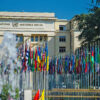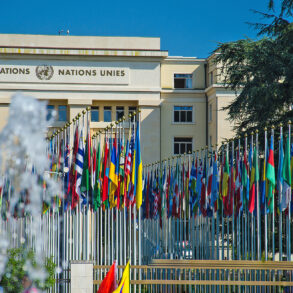The capital city of Sarajevo never fails to impress – especially if you are interested in Islam in Europe. The Bosnian metropolis changes, reminds and inspires the guest.
ISLAMIC TIMES – One of the most beautiful books in the world of travel literature is undoubtedly The Italian Journey by Johann Wolfgang von Goethe. In it, the writer explains nothing less than the actual meaning of travel. For almost two years, he reflected on nature, art and the people he encountered along the way in northern Italy, Rome, Naples and Sicily.
He expected his journey to a foreign country to bring about a change, a metamorphosis of his personality. He always tried to keep his (Greek) ideals alive, because he was aware that he lived in a different space-time in Weimar. His inspiration was to incorporate his insights into a new everyday life after his return.
A visit to Sarajevo is fruitful
With this intention of updating, a visit to Bosnia is fruitful. The capital Sarajevo is always impressive – especially if you are interested in Islam in Europe. If you look at the city from the mountains, the local architectural history, with its manifestations lined up like a string of pearls, tells of the life and fate of the people. In the city, you experience unparalleled hospitality and quickly become part of a relaxed lifestyle.
This is truly not a matter of course after the horrors of the Bosnian war in the 1990s. The metropolis changes, reminds and inspires the guest. And of course, the country’s history urges it to seek active exchange with its neighbours, especially if they belong to other cultures or denominations.
The Ghazi-Husrev-beg Mosque, the centre of the Ottoman-influenced old town, with its doors open to all visitors, seems like an invitation to enter a spiritual inner space that allows you to forget the colourful hustle and bustle of the alleys. One should not forget that the sacred space is part of a larger complex. The infrastructure around the building consists of public, social and economic facilities.

Call to evening prayer and breaking of the fast in Sarajevo, Bosnia. (Photo: Ammar Asfour)
The phenomenon of foundations
It is the phenomenon of the foundations that bears witness to the higher intentions of the Muslims. In the mosque museum, I read the will of Ghazi Husrev-beg from 1531. It is an appeal for generosity, a confession of the meaning and purpose of the foundations, which are designed to be permanent and explicitly withdrawn from political influence or instrumentalization. The founder lived in a different, bygone era – but this social idea remains. A peaceful society is only conceivable if the poor and needy are given access to knowledge and a dignified life.
Personally, I am fascinated by the constellation of religious, social and economic infrastructure around the venerable building; an interplay that holds the possibility of balance. This is not a museum visit. Rather, it is a model that reminds Muslims and tourists from around the world that Islamic practice cannot be reduced to politics. Our journey is not about romanticising the past, but rather about understanding the rationale behind this urban approach.
Ideally, a mosque complex is not just a sacred, closed space. The needs of people seeking meaning and purpose, the nurturing of the neighbourhood, the needs of the poor, the necessities of travellers or traders are also met. How we incorporate these aspects into modern urban development in the 21st century is one of the most important questions for our intelligence.

Prof. Dr. Enes Karic at a press conference. (Photo: YouTube)
Writers write the stories – an encounter with Prof. Dr. Enes Karic
It may be a bird gently landing on a wall. Leaves blown by the wind over the graves. A look, a gesture that you see on the street. The phenomena that really affect us, move us, amaze us or frighten us, leave us speechless for a moment. We search for words to describe the reality of the beautiful or the terrible.
Writers devote their lives to this search. Sarajevo is not only a city that writes history, but also a magnet for all those who want to write, understand and read it. Sometimes you find books, or they find us. So we enter a small bookshop and discover a profound work by Prof. Dr. Enes Karic: Songs of Wild Birds.
The book, about the role of power, love and faith, is historically set in the Balkans in the 16th century and is at the same time an update of religious and philosophical questions. It becomes clear that there were no ideal conditions at any time, but there was an effort to achieve certainty, honesty and orientation towards moral principles. I read the book at night and am amazed. Everyone has their own heroes, and I admire the writer’s ability to express the richness of his experiences.
In the morning, I visit the City Literature Museum and read some biographies of men and women whose names sound strange to me. Some have been forgotten, others have become famous, like the Nobel Prize winner Ivo Andrić. They all share the same passion and write about what they believe or do not believe in. Only quality is the benchmark: an unbeliever who writes well will not unsettle believers, but only encourage them to expand their knowledge and believe even more deeply.
You don’t get to know another perspective by dealing with the lowest forms of expression of this culture. That is why it is worthwhile to engage with the thinkers and poets who are able to communicate their experiences at the highest level. This does not mean that you necessarily share the quintessence of the matter, but it is an expression of respect for the hard work in the quarry of words. Live and let live, as a condition for peaceful relations with others, is not based on insubstantiality, but on the realisation that people experience different histories.
Experiencing and understanding these differences does not create insecurity about one’s own identity, but rather ends up enriching it. For example, I often read the works of dissidents and recognise in them the paraphrase of the first part of our creed.

The Gazi Husrev-beg Library has had a new home since 2014. (Photo: O. Dikbakan)
Islam is an ocean of knowledge
Islam is a sea of knowledge. We visit the museum of the Gazi Husrev-Beg Library, founded in 1537, with its collection of tens of thousands of books. The oldest manuscript is a copy from 1105 of the Ihya’ Ulum ad-Din by Abu Muhammad Al-Ghazali. There are also countless works in Bosnian, Arabic, Persian and Ottoman languages. In the modern building, I see students from afar, absorbed in their treasures and pursuing their thirst for knowledge. What are you studying? The possibilities are endless.
“I know that I know nothing” is one of the insights that we mere mortals, who only have very modest knowledge, like to repeat. It is the scholars, including the gifted writers, who can save us time, help us and share their knowledge. When we meet them in person, a sure sign that the mediation has been successful is that we come out of the encounter changed.

Photo: Paul Katzenberger | Lizenz: CC BY-SA 3.0
The time of war
Another important chapter in this city is described in books that trace the course of the war in the 1990s. They deal with the incredible, with former neighbours becoming enemies, with crimes and heroic deeds, with hope and despair. Many of these books were written in tears and create a culture of remembrance that acts as a warning in times of burgeoning nationalism in Europe.
Every evening, when we want to go up to our accommodation high up in the mountains from the old town, we take a taxi. The guild has made good arrangements, there is a standard price that cannot be negotiated. Interesting conversations about the country and its people develop along the way. For example, the ride with a friendly taxi driver who speaks very good German is impressive.
As a young woman, during the war, she lived in Germany for two years and later returned. It was a hard time, she sighs. “I was terribly homesick and feared for my parents, who continued to live in Sarajevo.” I ask her if she thinks it’s possible that the terrible events could be repeated one day. “Yes, I think so. We all think so,” she replies with a pained smile that accompanies a shrug. At the same time, her melancholy expression reflects both concern and resignation to fate.
We are talking about her economic situation. She complains that her well-educated children can hardly find work. We understand: what mother likes to see her loved ones leave home? And she hints at something we often hear in our conversations with Slovenes, Croats and Bosniaks: “In Yugoslavia, conditions were modest, but at least there were no such extreme social differences.”
We don’t think that this is nostalgia, or even a yearning for the return of communism. The message is simpler: there are not only economic winners in this region, but also poverty and fears for the future. These phenomena – and not only in this region – are always the breeding ground for political troublemakers.
We bid a warm farewell to the woman and the conversation continues to have an effect. The next morning, we visit the market hall in Sarajevo. Here women sit in front of their fruit and vegetable stalls, looking bored. Business seems to be slow, and it is quiet this morning. In the corner of the market, we see the traces of a grenade impact. Many people died here on 5 February 1994. As with any war, as an outsider you cannot imagine what a long-term siege and living in constant fear of being killed means. You can only stand here in silence.
Reasons for healthy optimism
Thankfully, there are good reasons for a healthy optimism. There is no question that the country is developing: in many cities in Bosnia, you can see new buildings, modern office blocks and new streets. Alongside the vibrant life, you can still see the scars of days gone by on the old houses. Here you learn that peace is something valuable and that you must use this time to build bridges. Of course, this practice goes hand in hand with the obligation to reject nationalism and any other form of extremism. The existence of mosques, synagogues and churches is a testament to a tradition: the art of living together in a confined space. That is something you take home with you from Bosnia.
In his book The Shadow of Cities, the writer Dzevad Karahasan wrote some universally valid sentences about his homeland: “In Sarajevo, cultural identity (…) is inextricably linked with a kind of social unease, because the social context of people in Sarajevo is a constant reminder that the world is full of different people, that one’s faith is only one of many, that one and everything one has are only one of countless possibilities in the ocean of divine omnipotence.”
For the Bosnian thinker, whether he sees this situation as an opportunity, an obligation to get to know each other, or a danger depends on the character and experiences of the individual. This challenge of creating a climate of coexistence based on mutual respect is one that all European cities face today. Remembering both the successes and failures of the past is part of how we learn from history.











